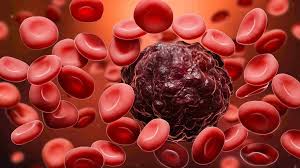
New Blood Test Could Transform Prostate Cancer Treatment Decisions
A simple blood test might hold the key to determining the best treatment approach for men with advanced prostate cancer, potentially guiding them toward therapies that offer the greatest chance of success and improved survival. A recent phase 3 clinical trial has found that measuring circulating tumor cell (CTC) counts can predict which patients are more likely to respond to standard treatments and live longer, while also identifying those who may benefit from more aggressive experimental therapies.
CTCs are cancer cells that break away from tumors and enter the bloodstream, making them a vital indicator of disease progression. While researchers have previously examined CTCs in prostate cancer, their role had largely been explored only in its later stages. This new study, however, focused on men who were newly diagnosed with metastatic prostate cancer.
“No one, until now, has looked at whether CTC counts can be used right at the beginning, when a man first presents with metastatic prostate cancer, to tell us whether he's going to live a long time or short time, or whether or not he will progress with therapies,” said Dr. Amir Goldkorn, the lead study author and associate director of translational sciences at USC Norris Comprehensive Cancer Center in California.
The study’s findings are striking. Men with higher levels of CTCs in their blood had significantly shorter median survival times and were at a higher risk of death during the study period. Their cancer was also more difficult to control with standard treatment, and it tended to progress faster compared to men with lower or no detectable CTCs.
"You couldn’t tell these men apart when they walked in the door," Goldkorn noted in a press release from USC. "All of their other variables and prognostic factors were seemingly the same, and yet they had very, very different outcomes over time."
The research team used a widely available blood test called CellSearch to identify patients less likely to respond to standard therapies. The study was part of a phase 3 clinical trial conducted by the SWOG Cancer Research Network, a collaboration involving over 1,300 institutions nationwide dedicated to advancing cancer research.
Blood samples from 503 men with metastatic prostate cancer were analyzed as part of a new drug trial. The study revealed that patients with five or more CTCs in their blood sample had the poorest outcomes. These men were more than three times as likely to die during the study period compared to patients with no CTCs, and nearly 2.5 times more likely to see their cancer progress.
Additionally, men with five or more CTCs were less likely to have a favorable response to treatment, as indicated by lower prostate-specific antigen (PSA) levels. Their median survival time after the blood test was 27.9 months, compared to 56.2 months for men with one to four CTCs and at least 78 months for those with no CTCs.
The conclusion is clear: a higher number of CTCs correlates with faster cancer progression, poorer response to treatment, and shorter overall survival.
The findings, published in the journal JAMA Network Open, suggest that measuring CTC levels at the onset of therapy can offer valuable insights into long-term survival prospects. This could pave the way for more personalized treatment strategies, ensuring that patients receive therapies that are most likely to be effective for their specific condition.
"We want to enrich these clinical trials with men who need all that extra help—who really would benefit from three drugs versus just two, or from being on a new chemotherapy drug, even though it may have more side effects," Goldkorn said.
Building on this research, Goldkorn and his team are now developing a new blood test that not only measures CTCs but also examines the molecular makeup of these cells and tumor DNA in the blood. This approach aims to identify even more precise biomarkers that could serve as better predictors of prognosis, ultimately enabling doctors to provide more tailored and effective treatments for men battling advanced prostate cancer.